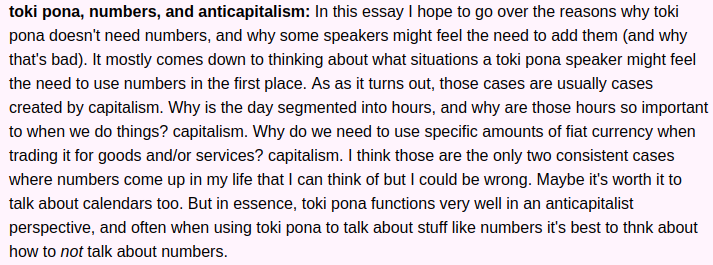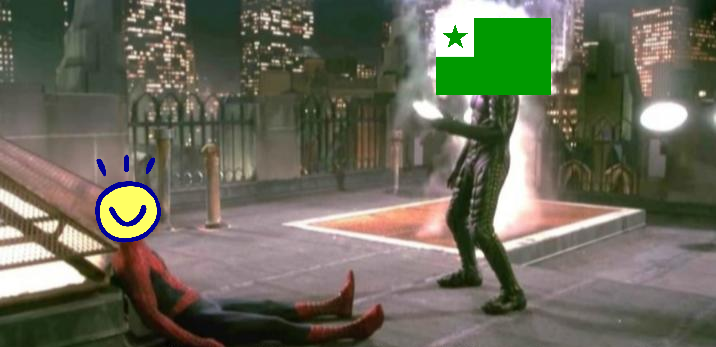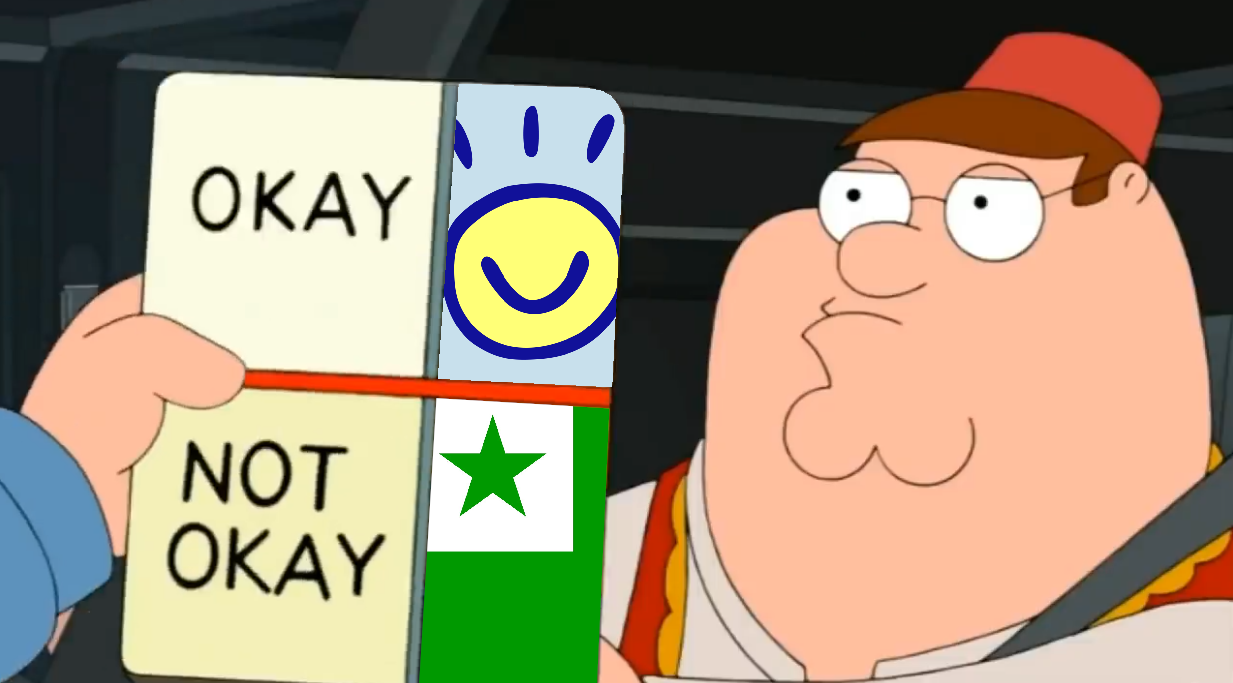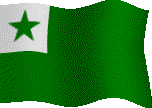Critique of Toki Pona (WIP)
English · Español · Esperanto

Back to Articles
Contents
Introduction - toki open
mi akesi Lipu · pilin mi la toki pona li ike ala · mi kama sona e toki pona la mi toki taso e toki Epanja e toki Inli · mi kama sona e toki tu ni la mi jan lili · tenpo ni la mi kama sona e toki Epelanto e toki Sonko · mi kama sona ala e toki pona la mi open ala kama sona e toki ante
lipu lipamanka pi toki pona taso li pana e sona ni, tawa mi: jan li kepeken pona a toki pona la toki pona li wawa · pilin mi la lipu Waso li lipu ona pi pona nanpa wan · sina lipamanka la sina wile la o pana e ken tu ni, tawa mi: mi toki Epelanto e lipu sina · mi pana e ante toki pi lipu sina, tawa lipu mi
taso pilin mi la toki pona li awen jo e ike
I was originally going to provide an English translation of the text above, but decided against it, because there is so much stuff out there written in Toki Pona that is then immediately after translated into English by the person who wrote it, that it would feel like a cop out. Even the "official" Toki Pona translation of the Wizard of Oz does this.
In any case, now that I have appeased the Tokiponists by demonstrating basic competence in their language and literature (otherwise I will certainly be told I'm not good enough at it yet), it is time to start grilling. After initially being an enthusiastic user of Toki Pona, mostly using it to read and listen, there are many things about it that I would like to criticize. Think of this article as a Toki Pona version of the Ranto, "one of the few available information sources on the topic that isn't an advert."
Finally, I should clarify that I harbor no ill will towards the Toki Pona community. They put out a lot of good stuff and I have respect for them, as well as the language's creator, Sonja Lang, who to my understanding created the language during a difficult time in her life. My only goal is simply to provide a second opinion in an entertaining way, since most stuff out there talking about Toki Pona tends to do so in an uncritically positive way.
I – Little Annoyances
Words That Look Like Phrases

kasi mute li lon mani
There are many root words in Toki Pona which look exactly the same as two different roots put together. Many of these root combinations are grammatical, and some often lead to very repetitive sounding sentences in any case. First, I will discuss these specific examples which have actually caused me issues when actually using the language in real situations:
- mama → ma ma: This leads to the repetitive phrase ma mama for one's country/place of origin. One could use ma tan instead, but since tan can be a preposition, this might not always be desirable.
- mani → ma ni: Sometimes I have to do a double take when I hear ma ni because of this. Often, mani can be replaced with ma ni and the sentence will remain grammatical. Because ma and ni are both monosyllabic, trying to put stresses on the first syllable of both words is awkward.
- nimi → ni mi and lili → li li: Although ni mi and li li don't come up in practice, these words still yield the eargrating (some would say cute) common phrases nimi mi li (My name is) and li lili (is small). The word lili in particular leads to real pieces of work like soweli li lili li suwi (The animal is small and cute).
I will now list all of the remaining examples among the 120 words in Language of Good, courtesy of sona.pona.la, which might actually come up in practice:
- kalama (sound) → kala ma (local fish)
- lipu (document) → li pu (...interacts with Toki Pona: the Language of Good by Sonja Lang)
- utala (fight) → uta la (regarding the mouth). The latter might be useful for things like uta la moku li pona (regarding the mouth, the food is good) which could be interpretted as (the food tastes good). This phrase might be confused with utala moku li pona (food fights are good). Stress rules don't help since la is monosyllabic. You'd have to go out of your way to add unnatural stress to distinguish the two.
The reason these are a problem in my eyes, is because Toki Pona is already tricky enough to parse. A listener has to determine what parts of speech words are taking on, as well as consider context. The fact that these words blend together due to the way they sound only adds noise. It might have been fine if it wasn't so preventable! One possible solution is:
- lipu could change to lipo.
- nimi could be replaced with a softer neme.
- We could preserve the sound symbolism of lili with wiwi.
- Replace ma. I personally like Greenlandic nuna.
- We could tweak uta as uto.
While we're at it, we might as well talk about how ale (everything) and ala (nothing), despite being antonyms, are extremely similar. Fortunately, many people already agree that this is a potential issue, which has popularized the alternative form ali. However, this introduces yet another use of the ever-present syllable li, and still the only difference is a vowel in an unstressed syllable, suggesting a more thorough face-lift might be in order.
II – Toki Pona as a Minimal Language
To Simplify Thought
Toki Pona's original goal was to simplify the thoughts of its users. I would say that Toki Pona successfully achieves this goal. So does ka. My point is that this isn't a particularly difficult goal to reach, so it is sometimes stated in different ways. One such way is to say that the goal of Toki Pona is to strip away extraneous detail and focus on what is relevant. However, there are a handful of Toki Pona words which stand in opposition to this goal.
For example, there is no generic word for animal. You have to specify whether or not it is a jan (person), a kala (fish), a pipi (insect), an akesi (reptile), or a soweli (other land animal). Some might try to use soweli as a general term for an animal, but this is bound to cause confusion.
There is also no general word for long, thin objects. If you want to talk about long objects, you must specify whether or not that object is palisa (stiff) or linja (flexible) despite the fact that there is already a word kiwen for hard objects, and replacing palisa and linja with one general word for long, and one word for soft/flexible would not increase the total word count. In fact, you could argue that ko could serve as the word for soft/flexible, and thus having a single word for "long" would save words without creating complications.
I suppose at this point you could respond with a poetically worded description of how one might go about describing long objects without specifying hardness as being big from one perspective and small from another, or how one might describe an animal as a really really cute creature that moves and has emotions and can love others or some other nonsense.
But if Toki Pona's goal is to encourage stripping away irrelevant details, why would its basic vocabulary require speakers to add additional details to the concepts "animal" and "skinny" in the first place, even when the exact kind of animal or the exact kind of long object is not relevant? I personally don't mind having to make these distinctions, but that doesn't change the fact that this is the opposite of stripping away irrelevant details.
There is a triplet of words, though, that really take the cake for spitting right in the face of the philosophy of simplifying. To be fair, they aren't unavoidable like the examples previously mentioned, as one could use lipu or lukin, but they are still totally incongruent with this goal of the language. These words are pu, ku, and su. These words are overflowing with detail by virtue of the fact that they were essentially only created to plug jan Sonja's merch.
 ITT: More interesting ideas for pu. Courtesy jan Kekan San
ITT: More interesting ideas for pu. Courtesy jan Kekan San
Don't get me wrong - there's nothing inherently wrong with trying to make a bit of money off of a project you're working on. However, these words signify to me a lack of faith in one of the basic premises that makes Toki Pona possible at all. Namely, the premise that context and description are sufficient to disambiguate when necessary in a variety of situations.
Instead of pu, we could say lipu nanpa wan pi jan Sonja (Sonja's first book) or lipu lawa pi toki pona (Toki Pona Rule Book, though some might disagree with this characterization). We could call ku lipu nimi pi jan Sonja (Sonja's dictionary), and su could be jan Osu pi wawa nasa pi toki pona (Toki Pona version of the Wizard of Oz) or in the future lipu musi pi jan Sonja (Sonja's story books). If these are too long, we could just abbreviate the names to lipu nanpa wan or jan Osu once the context is clear. This kind of scrutiny is what most proposed new words go through before being adopted or rejected by the Toki Pona community. Why not these?
Making these words all the more brazen is that they are only one syllable long, while the basic preposition kepeken is three syllables long! But hey, at least it's fun to pronounce. kepeken kepeken kepeken. Not to mention, if you insist on adding a word with the meaning of pu to the language, the choice of the syllable pu could hardly be more fitting.
To Be Practically Minimalist
I've seen critiques of this kind time and time again, in many different shapes and sizes. Rather than admitting that their beloved language might not be the embodiment of the Platonic ideal of its original goals, Tokiponists usually respond by moving the goalposts and saying that the language isn't meant to be simplifying thought, actually. It is meant to be practically minimalist. That is, it is meant to be a balancing act between being viable for (key word!) general purpose use while still remaining relatively minimal.
"The language's simplicity aims for a happy medium where things are not overcomplicated, but not too limited for speech, understanding, or fun." sona.pona.la
In fact, it would seem that the original goal of simplifying thoughts has turned into more of a suggestion, and the original admission that Toki Pona might be too limited to express certain concepts is being challenged by even its creator, who once said as much.
"Initial descriptions emphasized simplifying one’s thoughts... In recent years, Toki Pona has proven itself as a powerful, versatile, and general-purpose language, limited only by the user’s skill." tokipona.org
Let us then examine the language under the supposition that this is the goal. First of all, I want to note that even if the language is only limited by the user's proficiency, that doesn't mean that the language doesn't reach its practical limits significantly faster than more "complete" languages.
The Brainfuck programming language, for example, only uses eight characters for its code. We can be unshakably confident that Brainfuck is just as capable as any other programming language because it is Turing complete. Yet it is obviously completely unworkable for all but the most basic programs in practice. Of course, programming languages are different from human languages, but my point is that even if there was some clear-cut metric by which Toki Pona is just as capable as any other human language in theory, that doesn't mean it can't still have a practical limit.
Anyways, Since the Toki Pona Dictionary, some 17 Major Dictionary Words and a bunch of Minor Dictionary Words have been added to the language. Given that the goal of the language has changed from mainly being thought simplification to mainly being practical minimalism, let's examine some of the practical problems with Toki Pona and see how these new words help with them! I mean, they must do something, right? Otherwise they wouldn't have been adopted by a community that is hesitant to adopt new words.
Number System
Starting off with the low hanging fruit, huh? Criticisms of Toki Pona's number system are a dime a dozen, but I will talk about it anyways.
In the original number system, wan is one, tu is two, and mute is more than two. Though imprecise, it is a very clean system, and every single quantity is well defined. When this system was created, the language's creator didn't see exact quantities as important for what she was using the language for, and making the language usable for general purposes was not all a priority.
For Toki Pona's original goals, this system makes perfect sense. The problem is that as Toki Pona's community grew, so did its ambitions. I assume there weren't any mathematicians in the room when the abomination they would create next was summoned into existence.
nasin nanpa pona monsuta
In the current number system, wan and tu kept their original meanings. The meaning of five is added to the word for hand/arm, luka. The meaning of twenty is added to mute, and the meaning of one hundred is added to ale. To create other numbers, you put them together additively, organized from greatest to smallest. The order is important since more recently, the behavior of ale was amended so that putting smaller numbers before it behaves multiplicatively.
luka ale mute mute luka tu wan → 5 x 100 + 20 + 20 + 5 + 2 + 1 = 548
Putting aside its seemingly random assignment of values, this system is, in a vacuum, functional. The problem is in actually forcing it into the language. For one thing, luka already has the non-numerical meaning of hand, as previously mentioned. But even worse, mute and ale already had numerical meanings! mute already meant more than two, and ale already meant all! Why not instead go with noka for 10 or something?
len luka → Five textiles, or a non-specific amount of gloves?
len luka luka → Ten textiles, or five gloves?
len luka mute → Hey, at least this one is clear cut: numbers go in order, remember? This means twenty gloves! Or, wait, does it mean many gloves?
len luka ale → ...Crap. Five hundred textiles, or all the gloves?
jan ale → A hundred people, or everyone?
Pretty much every Toki Pona speaker is aware that this system is terrible, which is why there are so many competing proposals for number systems floating around.
A Tokiponist might at this point respond in a number of different ways:
"Numbers are not in line with Toki Pona's philosophy. You are encouraged to avoid using them."
 Tokiponists when you use a number
Tokiponists when you use a number
The great thing about conflicting goals is that when someone tries to hold something accountable to them, you can just flip-flop between them. Pick your battles! Is Toki Pona meant to simplify thought, or be practically minimalist for general use? Unless you're the Pirahã, and most people aren't, a language that discourages the use of numbers through ambiguity by design is a language that is not concerned with general use. What if you're playing a game with a points system? What if you like recreational mathematics? What if you're trying to get the right dose of life saving medication? Besides, just because you don't use numbers doesn't mean other people won't, so the ambiguity is still an issue.
"The different meanings can be disambiguated thru context"
Ah, yes, context, the miracle cure for everything that might conceivably be wrong with the language! Unfortunately I can tell you from experience that it does not always work.
Context Failure #1
Even if it always did work, this issue is extremely preventable. If you want a number system that can express large numbers clearly, doesn't require lots of words, yet is unwieldy for speech or writing, binary is the solution you're looking for. Only two words are needed to implement binary, and this would avoid polluting existing content words like luka.
At this point, though, that ship has sailed. However, we see a hint of a fix in the word nanpa, which can be used as a particle that turns whatever comes next into an ordinal number. Anything that comes after nanpa, when it is used this way, is unambiguously a number. More than just being clear, it even enables lipu tenpo to use general content words as numbers for each issue they put out.
The solution, then, is to introduce a cardinal analogue of ordinal nanpa. I vote for ke, from Mandarin 個/个 gè (i know this is ku lili im setting up for a joke i haven;t written yet), which does something similar. When numbers are used to count, a classifier is required. This is the most common one. This enables words like the word for one to be used in compounds without as much trouble. Let's explore the consequences of such a word:
len luka → Gloves len ke luka → Five textiles len luka ke luka → Five gloves len ke luka luka → Ten textiles |
len luka mute → Many gloves len luka ke mute → Twenty gloves jan ale → Everyone jan ke ale → A hundred people |
If you want to avoid using numbers in Toki Pona, then you should be in favor of something like this, since letting everyone else use ke, while refusing to use it yourself, would eventually ensure no one thinks you're using numbers ever again. Additional benefits are the ability to use wan and tu as typical content words, and allowing any content word to be a number, like in lipu tenpo, potentially rendering nimi sin for numbers obsolete.
ona li kama jo e mani ke ala → They got no money.
ona li kama jo e mani ala → They got something (it wasn't money)
kulupu ke wan → One community
kulupu wan → United community
len noka → Footwear
len ke noka → Ten textiles (?)
We could even use it to distinguish demonstrative ni from relative clause ni. The possibilities are endless! If you think this word is nice and would like to use it yourself, I suggest 个 as the sitelen pona symbol, though with the triangle converted to a semicircle to distinguish it from directional ni.
Parts of Speech
 Vi kaj mi ne estas tro malsimilaj.
Vi kaj mi ne estas tro malsimilaj.
Up until now, I've been talking about how I believe Toki Pona has its practical limits, I provided an example of how context is sometimes not sufficient to disambiguate, and I even proposed a new word. Does this mean that I think that a language which has as few words as Toki Pona is doomed to be very limited?
No! My experience with the vocabulary actually matches that of experienced Toki Pona speakers (go figure). Toki Pona's vocabulary is extremely capable for its small size. So where's the problem? Long story short, I feel that Toki Pona's powerful root words are wasted on its clunky and inflexible grammar. We saw a microcosm of this in the numbers section. Let me explain.
When people ask how its possible for a language with so few words to be usable, the answer they usually get is that context disambiguates. Of course, I've already said many times that this doesn't always work, and I'll bring up more examples later. When people just talk about context and leave it at that, they are not telling the whole story.
I feel that the Wiktionary appendix on Toki Pona most closely describes the way the language actually works, at least in my experience: Every content word has relatively straightforward and concrete meanings as a given part of speech. The part of speech in use is then usually determined by grammatical particles and word order, with context being secondary. This means that while Toki Pona as originally published only has 120 words, it might as well have about a thousand.
However, once the sentence is parsed, the words, though reasonably concrete, are quite broad (I know this might sound contradictory, but think about how the word "house" is quite concrete despite not specifying the layout or color of the house). This is when context finally comes in. Let's take a look at an example:
jan suli pana telo pona
"Person of big of giving of water of good?" What on Earth does this mean? If you ask a Tokiponist, they'd notice the glaring problems, and might disagree on the meaning after trying to translate. For good reason, too. This is a total word salad. Now let's add particles.
jan suli li pana e telo pona → A big person gives a good liquid
Of course! The "e" marks the object of a sentence. Therefore, telo must be a noun. Since "li" marks the start of a predicate, and there is an object, the single word between li and e is a verb. Word order then tells us that suli and pona are modifiers. Since their semantic space is generally most fitting of an adjective, these are without a doubt adjectives. Great success! What if the particles were different, though?
jan li suli e pana pi telo pona → A person biggens giving of good liquid
Right, now suli is the verb, and since suli's semantic space is most fitting of an adjective, the usual transitive verb interpretation is to make big/important. Now pana is a noun, and since it is usually a verb, we can interpret it as the action of giving, or the generic object of giving: a gift. Choosing between the two fairly concrete interpretations of big/important and giving/gift is the only thing that is left to context. The particles do the bulk of the work.
Possible final interpretation: Someone increases the distribution of good water
My claim is that at least as an idea, this system is fundamentally no different from the way Esperanto works. Each root has a basic class (pana is a verb, suli is an adjective) which informs how the root is interpreted as a different part of speech. The parts of speech themselves are then determined by grammar rules. The main difference is that Toki Pona uses an analytic approach and Esperanto largely uses an inflectional one with lots of redundancy.
homo granda donas akvon bonan: A big person gives good water
homo grandigas donon de akvo bona: A person biggens giving of good water
This shouldn't be too surprising. Toki Pona was born and raised within the Esperanto community, and constructed languages tend to take on the form of languages the creator is already used to, even if they're trying to avoid it.
The problem is that while Esperanto has suffixes for every part of speech, and additional suffixes to clarify or add redundancy to what exactly you intend when using that part of speech, in Toki Pona, those two particles and word order are basically all you get.
This means that sometimes a straight-forward word for something I want to talk about exists, but can't be used without sacrificing unacceptable amounts of clarity, because the part of speech I want cannot be marked in a straight-forward way when the word is placed in that location.
Again, this all made sense when Toki Pona was not concerned with practicality and chiefly sought to encourage simplification. But now that the language is selling itself as a powerful general purpose language that just so happens to aim for minimalism, and seeing that the Toki Pona community is open to additions and certainly very open to at least experimenting for fun, why not look for solutions?
Before using your thought terminating cliché of choice again, note that context can clarify what a sentence that is missing li and e should mean. See below.
 jan moku kala moli vs jan moku kala moli
jan moku kala moli vs jan moku kala moli
Think pictures this descriptive are cheating even though the famed talk on, let's face it, mostly just Euclidean Geometry, uses them extensively? Then here's a whole story!
jan moku soweli · jan moku kili · jan wile moku kala · taso kala wile ala moli · kala moli jan la jan ken ala moku kala · kala pali seme · kala kama suli kama wawa · kala utala jan kepeken wawa · jan kama anpa moli · kala pilin pona
Despite this, their use is not only accepted but grammatically mandatory, and for good reason. Why draw the line there? Is the difference between "the language should be practically minimal" and "context is enough" just "jan Sonja decided its good enough one day" back when the language's ambitions were much smaller? If avoiding importing new words is the goal, but it has already happened anyways, is a good particle not worth a thousand?
Toki Pona as an Auxiliary Language
Introduction

In a perfect world, the critique would have ended by now. Alas, the world is not perfect. Although Toki Pona is not, and never has been, built to be an international auxiliary language, a surprising amount of people still argue that it would make for a good candidate. Comparisons to Esperanto abound. While I'm not sure when exactly this started, I suspect the Conlang Critic videos on these languages proved influential.
Although jan Misali's videos on Toki Pona and Esperanto are over half a decade old at this point, and they've since changed to the somehow more reasonable position that a good international auxiliary language is impossible, the ripples continue. Language Simp (I know his videos are jokes and I like them, but its the most prominent example) proposes Toki Pona as a better alternative to Esperanto, for instance, and the Conlang Critic episode for Toki Pona remains on the front page of tokipona.org. It and the Esperanto episode retain surprisingly active comment sections.
That's why I feel the need to disrespectfully disturb the grave of these ancient videos to claim that most of the criticisms levied at Esperanto also apply to Toki Pona.
Phonology
Note: I am not an expert in phonology by any means. Please correct me if there are any mistakes.
There is very little point in pretending that Toki Pona's phonology isn't excellent for an IAL, and a huge step up from Esperanto. But there's more to communication than that, so it alone can't carry the language as an IAL candidate. Furthermore, the phonology, if judged by the same standards as Esperanto, still retains similar problems. Take a look:
- Mandarin Chinese doesn't have [ki] or [kin]. Best we can do is [t͡ɕi] and [t͡ɕin]. It seems that the sequence [kj] does exist according to Wiktionary, but only occurs in obscure slang. To be fair, I doubt this would actually cause that many problems to someone learning, but then [kn], [kv], and [st͡s] didn't cause me that many problems learning Esperanto either, despite the fact that neither my native language nor English have these sounds.
- English doesn't have [o] as a monophthong, its /l/ is velarized, and in the positions where the sounds occur in Toki Pona, English aspirates /p/, /t/, and /k/.
- In some dialects of Spanish (Argentina comes to mind), the phoneme /j/ is rendered as [d͡ʒ]. In my dialect, it is [ʝ]. Spanish from Spain has its prominent lisp, which might complicate /s/.
- Japanese doesn't have [si]. Best we can do is [ɕi]. There's also the possibility of /l/ being realized as /ɾ/
There might be more issues in other languages, but these are the ones I know about. Of course, the simple solution is to allow variations in the way phonemes are pronounced. Unfortunately, when Esperanto allows variation in /r/...
The biggest problem with the whatever rhotic is that it automatically creates a divide in the speaking community, where it's immediately obvious what someone's first language is if they pronounce the rhotic a certain way. - jan Misali
And I can say from experience that even in Toki Pona, some people still have noticable acce- Oh, wait! This just in! Even though Esperanto apparently shouldn't do it even for a single sound, it's fine in Toki Pona!
Toki Pona's phonology is so small, it doesn't even matter how you pronounce its words. - jan Misali
I guess that's why it doesn't matter that Toki Pona's restrictive phonotactics sometimes render words unrecognizable. I had no idea supa was derived from surface until I started researching for this. Furthermore, tan does not sound like tsʰʊŋ, laso doesn't sound like glɑːs, awen is a stretch of ɦɑu̯dən, weka is a stretch of ʋɛx, and suno doesn't sound like sun.
Vocabulary
Tokiponists pride themselves on the fact that their vocabulary is much less Eurocentric than Esperanto's. This might be true, but it wouldn't be saying much. Let's examine Toki Pona's source languages carefully.
Here are the sources for all of Toki Pona's Major Dictionary Words, according to nimi.li: Tok Pisin, Georgian, Dutch, Finnish, Akan, Mandarin, Esperanto, Danish, Cantonese, Tongan, Welsh, Serbo-Croatian, Japanese, Lojban, Swahili, Inuktitut, Ojibwe, and Hindi.
On the surface, this looks pretty good, but let's peel back the curtain a little bit. The most obvious issue is that some languages are vastly over-represented. Finnish is spoken by only about 5 million people, yet gets 18 words, while Japanese, which has 125 million speakers and even a well-suited syllable structure, only gets three, and that's being generous! Hindustani has even more speakers, yet gets only one word, namako, which isn't even a Language of Good word. Furthermore, Arabic gets nothing!
There is an even more insidious trick that the lexicon pulls to look more diverse than it actually is, though. Take a look at the Japanese words: moku for eating, pan for grain, and monsuta for fear.
Do I even need to say anything? Even ignoring the odd decision to choose an onomatopoeia instead of the actual word for eating (食べる taberu), pan is transparently of Romance origin, and monsuta is transparently of English origin. They are only in Japanese due to the imperial expansion of those languages throughout the world. Same thing goes for kulupu, the only word from Tongan. Transparently from English group, all Tongan did was Tokiponize ahead of time. And let's not even get started with Tok Pisin, which is literally an English based creole!
So that's the way Toki Pona's vocabulary makes itself look more international than it really is. Think of an English word, look for a language that borrowed that English word, and pretend you actually just got it from that other language the whole time! What an innovative strategy. Even though this probably isn't what actually happened, it might as well be, because the end result is the same.
In order to account for this, I decided to take a look at all the words and reclassify them. Of course, this classification will be controversial, and some of my decisions are worthy of debate, but I still think it's a reasonably classification. Take a look:
~ NIMI KU SULI ALE PI TOKI PONA! ~
Onomatopoeic (6):
a, n, moku, mu, unpa, mama
A priori (5):
e, ijo, kokosila, ku, pu
Germanic (41):
akesi, ale, ante, awen, en, ilo, insa, jaki, jelo, kama, ken, kepeken, kulupu, lape, leko, loje, lon, lukin, mi, monsuta, mun, nanpa, open, pakala, pi, pilin, pini, poki, sama, selo, sitelen, suno, supa, suwi, taso, tawa, toki, tu, wan, weka, wile
Romance (21):
alasa, anpa, kule, kute, la, len, lete, li, mani, moli, monsi, musi, mute, oko, pali, pan, pipi, pona, telo, tenpo, waso
Finnish (18):
ike, kala, kasi, kijetesantakalu, kin, kiwen, linja, lipu, ma, mije, nena, nimi, pimeja, seli, sina, suli, walo, wawa
Slavic (13):
kalama, lawa, luka, nasin, noka, olin, ona, palisa, poka, sijelo, tomo, uta, utala
Sinitic (10):
jan, jo, ko, kon, ni, seme, sin, sinpin, tan, tonsi
Other (10):
esun, jasima, kipisi, lili, lupa, meli, misikeke, namako, nasa, pana
Georgian (8):
ala, anu, kili, o, sewi, soko, sona, soweli
Greek (4):
epiku, lanpan, meso, sike
Celtic (1):
laso
- Words From a Language Spoken in Europe: 106/137 77.3%
- Indo-European Words among European Sources: 80/106 75.5%
Call it not as bad as Esperanto. Call it whatever you'd like. I choose to call it still Eurocentric. You could say that it doesn't matter, because the vocabulary is so small it might as well be all a priori, but then why not just make it a priori?
This makes the words that look like phrases from the very beginning look even more ridiculous. Did they really not have more languages to choose from? Why not just make up the words from scratch with the aim of making them distinct? Either way, this seriously hampers the idea that Toki Pona is culturally neutral.
Conclusion
If after reading this you still choose to speak or learn Toki Pona over Esperanto, I only have one thing to say:
La Tokiponistaro neniam haltigos la neevitabla fina venko de la interna ideo, kiu iom post iom pliproksimiĝas per la laboro de niaj esperemaj samideanoj.
Niaj pacaj batalantoj certigos ke post la fina venko, ĉie brilos la mirenda verda stelo, ĉiuj havos gloregan samideanan vortaron, ĉiuj amos nian karegan majstron, la preĝenda Dio Zamenhof, kaj ĉiuj sur la tero eterne parolos nur Esperanton.
That's Esperanto for "I respect your opinion. Despite my critique, Toki Pona is still a very interesting language. I hope you attain all of your language learning goals and that you have an excellent day."
tenpo ni la mi o luka e kasi o alasa e pali e unpa




 Vi kaj mi ne estas tro malsimilaj.
Vi kaj mi ne estas tro malsimilaj.


